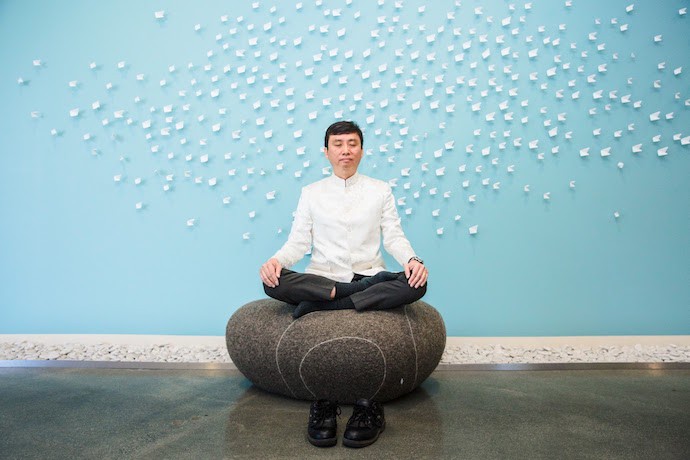Dharma companions is a blog focusing on Dharma activities, information dissemination and bringing awareness to the multifaceted aspects of Buddhism for the community from Shah Alam Buddhist Society (SABS). Postings should be of interest to Buddhist and anyone who seeks information on Buddhism. As the title suggest, we also aim to be a companion to those who seeks our company in this path that we undertake. May you be well, happy and peaceful.
Saturday, May 14, 2016
The actions we have done will stick with the mind
“…This path of practise, whether it is being generous, maintaining virtue, sitting in meditation, or developing insight meditation is wholly the responsibility of the mind and not the body. When the body dies, the actions we have done will stick with the mind. When the mind obtains a new body, it can pick up where it left off without having to start all over again from the beginning.
Labels:
Teacher,
Understanding
Location:
Shah Alam, Selangor, Malaysia
Translated from a traditional Pali chant from Sri Lanka
Greed's the root of negligence, greed's the root of strife,
Greed enslavement brings about, and in the future ghostly birth;
The Buddha who fully knows greed’s nature, I worship Him, the Greed-free One.
Greed enslavement brings about, and in the future ghostly birth;
The Buddha who fully knows greed’s nature, I worship Him, the Greed-free One.
Hate's the root of turbulence, of ugliness the cause,
Hate causes much destruction and in the future hellish birth;
That One who's known hate to the end, I honor Him who's free of hate.
Hate causes much destruction and in the future hellish birth;
That One who's known hate to the end, I honor Him who's free of hate.
Delusion is the root of all this misery, Creator of all ills is ignorant delusion.
Mind's blindness from delusion stems, as a dumb animal one will in future live.
The Buddha who fully knows delusion's nature, I worship Him, the Undeluded One.
Mind's blindness from delusion stems, as a dumb animal one will in future live.
The Buddha who fully knows delusion's nature, I worship Him, the Undeluded One.
Friday, May 13, 2016
Buddhists Take the ‘Gospel’ Music Path to Attract Youth
SINGAPORE (IDN | Lotus News Features) - Buddhist ideas and wisdom are being increasingly adopted by the West as part of a 21st century modern lifestyle, but in the East, youth are increasingly distancing themselves from their Buddhist heritage becoming “free thinkers” or even embracing Christianity from the West. A group of young Buddhist musicians from Singapore, Malaysia and Indonesia have now come together to reverse this trend by using music to attract youth.
Labels:
Inspirational,
Skillful Practice
Location:
Singapore
Kamma, Kamma Nimitta, or Gati Nimitta
"To the dying man at this critical stage, according to Abhidhamma philosophy, is presented a Kamma, Kamma Nimitta, or Gati Nimitta.
By Kamma is here meant some good or bad act done during his lifetime or immediately before his dying moment. It is a good or bad thought. If the dying person had committed one of the five heinous crimes (Weighty Kamma- Garuka Kamma) such as parricide etc. or developed the Jhānas, he would experience such a Kamma before his death. These are so powerful that they totally eclipse all other actions and appear very vividly before the mind's eye. If he had done no such weighty action, he may take for his object of the dying thought-process a Kamma done immediately before death (Āsanna Kamma); which may be called a "Death Proximate Kamma."
Labels:
Teacher,
Understanding
Location:
Shah Alam, Selangor, Malaysia
Thursday, May 12, 2016
Ambalatthika-rahulovada Sutta: Instructions to Rahula at Mango Stone (MN 61)
"Whenever you want to do a verbal action, you should reflect on it: 'This verbal action I want to do — would it lead to self-affliction, to the affliction of others, or to both? Would it be an unskillful verbal action, with painful consequences, painful results?' If, on reflection, you know that it would lead to self-affliction, to the affliction of others, or to both; it would be an unskillful verbal action with painful consequences, painful results, then any verbal action of that sort is absolutely unfit for you to do. But if on reflection you know that it would not cause affliction... it would be a skillful verbal action with pleasant consequences, pleasant results, then any verbal action of that sort is fit for you to do."
Labels:
Understanding
Location:
Shah Alam, Selangor, Malaysia
THE GREAT VEGETARIAN DEBATE
 IN STORYTELLING BY LAMA SURYA DAS 03/09/2016
IN STORYTELLING BY LAMA SURYA DAS 03/09/2016
Once a fine sheep, a goat and an ox who were with other animals feeding in the courtyard happened to hear about The Great Vegetarian Debate, and their faith in the Dharma was greatly renewed. “We take refuge in the Triple Gem,” they thought, “in the wise and compassionate Buddha, his meaningful message, and in those living ones who follow his ways. Wonderful are the lamas who protect the lives and well-being of we poor, helpless, destitute domestic animals, who only live to serve!” Such thoughts reverberated around in their thick skulls, as they contentedly munched bits of fodder and hay.
Wednesday, May 11, 2016
A ladder that leads us up to a higher goodness and happiness
Labels:
Teacher,
Understanding
Location:
Shah Alam, Selangor, Malaysia
Contemplating Suicide
by Lama Zopa Rinpoche, The Buddhist Channel, May 1, 2016
A student brought a friend who had contemplated suicide while depressed to see Lama Zopa Rinpoche. The following is Rinpoche's advice
It is also very useful to think that depression is not that undeserved for me. I deserve to have this, because I have done negative actions, various ones, all sorts of negative actions, in the past, and not just in this life, but from beginningless rebirth, therefore I deserve to experience this.
 The great bodhisattva saint Shantideva said: “In the past I gave such harm to others, therefore I deserve to receive this.” This is another very basic practice to make the mind happy, by accepting it and also by thinking of it as a result of karma done by oneself. When you think, “This is my karma,” it makes everything very simple.
The great bodhisattva saint Shantideva said: “In the past I gave such harm to others, therefore I deserve to receive this.” This is another very basic practice to make the mind happy, by accepting it and also by thinking of it as a result of karma done by oneself. When you think, “This is my karma,” it makes everything very simple. Whatever problem there is, this thought prevents there being too much fuss.
Generally, problems in life are created by the mind. This moment’s thought creates this moment’s problems. This moment’s thought is created by the mind of the past.
Labels:
Skillful Practice,
Teacher
Location:
Shah Alam, Selangor, Malaysia
Tuesday, May 10, 2016
President Obama Sends Greetings to Tzu Chi on 50th Birthday
Monday, 02 May 2016 16:45 Tzu Chi Foundation

Greeting from President Barack Obama. (Photo provided by Tzu Chi Foundation)
Saturday April 30 was the 50th anniversary of the foundation; a ceremony was held in the Jing Si Hall in Hualien. To bring his blessings, Mr. David L. Myers, director of the Center for Faith-based & Neighborhood Partnerships at the U.S. Department of Homeland Security, attended the ceremony.
Tzu Chi has spread its footprint in the U.S. since 1989. In October 2012, Hurricane Sandy devastated New York and New Jersey. Tzu Chi volunteers immediately mobilized, to provide hot meals and other services. The following year, the White House honored Tzu Chi Foundation as Hurricane Sandy Champions of Change.
Sota sutta (AN 5.140)
Labels:
Understanding
Location:
Shah Alam, Selangor, Malaysia
Queensland's Buddhist numbers swell
by Tony Moore, Brisbane Times, April 30 2016 Buddha Birthday Celebrations. Photo: Michelle Smith Buddha Birthday Celebrations. Photo: Michelle SmithIn 2011, 42,227 people in the Greater Brisbane area identified as Buddhists and just over 48,000 said they were Baptists. More than 66,000 Queenslanders today see themselves as Buddhists.The true figure will not be known until the results of the 2016 Census to run in August this year. |
Labels:
Inspirational
Location:
Shah Alam, Selangor, Malaysia
Monday, May 9, 2016
The Names of the Buddha
1. Bhagava
This is by far the most common name used in the suttas. It is more of a title than a name. It is also the 9th quality of the Buddha.
2. Tathāgata.
This is another very common way of referring to the Buddha. This is the way the Buddha will most often refer to himself. It is a difficult word to translate, but he gives us a good explanation in the Lokavabodha Sutta.
This is another very common way of referring to the Buddha. This is the way the Buddha will most often refer to himself. It is a difficult word to translate, but he gives us a good explanation in the Lokavabodha Sutta.
3. Gotama/Gautama
This was his family name.
This was his family name.
4. Sidhatta/Siddhartha
This is what we would nowadays call the Buddha’s first name.
This is what we would nowadays call the Buddha’s first name.
5, Sākyamuni
This means Sage of the Sākyas, the kingdom where the Buddha was born.
This means Sage of the Sākyas, the kingdom where the Buddha was born.
Labels:
Understanding
Location:
Shah Alam, Selangor, Malaysia
RICH PEOPLE NEED INNER PEACE TOO

If the words “corporate” and “mindfulness” no longer sound strange together, it’s partly because of the career of Chade-Meng Tan.
A software engineer from Singapore, Tan joined Google in 2000 as employee number 107. He later founded the company’s in-house meditation program and became one of corporate mindfulness’ most visible advocates.
Sunday, May 8, 2016
My Venerable Elder Bhikkhuni Mentor.
Today, for Mother's Day, i would like to pay very special tribute to my venerable elder bhikkhuni mentor. She was born in South Korea, and her Buddhist name is "Myeong Seong" (명성 眀星) 스님 - which means "Bright Star" - the bright star the Buddha opened his eyes to see on the morning of his full awakening, his Maha Sambodhi.
I feel very fortunate to have had an elder bhikkhuni mentor and supporter in monastic life, as many of my fellow Theravada bhikkhunis have not had such an opportunity. There are many good things that are shared in Buddhist monastic life between different orders and traditions, even as there are also many uniquenesses to each monastery, teacher and tradition.
My venerable bhikkhuni mentor--or "Eun-sa Sunim" (은사/恩師 스님) in Korean language has a heart of great enormous love and dedication for the Sangha. She also has incredibly deep love and respect for the Dhamma, and also great dedication to teaching and sharing the Dhamma. She is a master teacher of three main traditions: the teachings of Early Buddhism/Sravakayana as passed down in the Agama Sutras (like the Pali Nikayas), the Madhyamaka Middle Way teachings of Nagarjuna, and the One Vehicle Avatamsaka teachings.
Great reverence to our first Bhikkhuni foremother, Mahapajapati Gotami

Theravada Buddhist Council of Malaysia
Great reverence to our first Bhikkhuni foremother, Mahapajapati Gotami (Mahaprajapati Gautami), ordained with the Buddha on this September full moon day 2597 years ago.
- Ayya Tathaaloka Bhikkhuni
Labels:
Inspirational
Location:
Shah Alam, Selangor, Malaysia
We should know how to develop wisdom
“…If we wish to maintain peace of mind, we should use wisdom. If we do not use wisdom, then when we see a body, emotion will arise; agitation will arise; restlessness and worry will arise; and lust will arise. But if there is wisdom to neutralise our emotional reaction, when we see a beautiful image we focus on the ugly aspects and the sexual urge loses its power, allowing the mind to calm down.
Labels:
Teacher,
Understanding
Location:
Shah Alam, Selangor, Malaysia
Subscribe to:
Comments (Atom)












